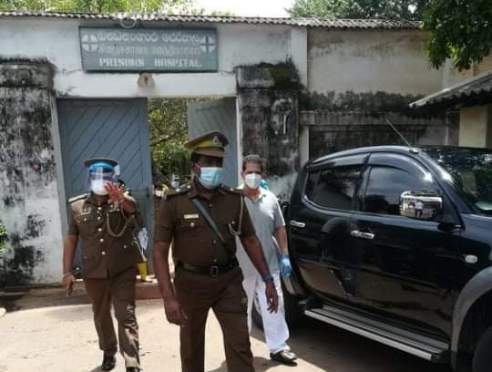Duminda Silva: Anger as Sri Lanka frees politician sentenced for murder
By Anbarasan Ethirajan
COLOMBO – The UN and human rights groups have criticized Sri Lankan President Gotabaya Rajapaksa’s decision to pardon a convicted murderer, warning it undermines the rule of law.
Former MP Duminda Silva was sentenced to death along with four others in 2016 for shooting dead a rival politician and three of his supporters in 2011.
r Silva, who was a political ally of Rajapaksa, is among 94 prisoners to be given a presidential pardon.
Rights activists have reacted angrily.
“It shows complete disdain on the part of the executive for the rule of law, for legal process and for public accountability,” Ambika Satkunanathan, a human rights lawyer based in Colombo told the BBC.
Rajapaksa came to power on a Sinhala nationalist campaign in November 2019. He was the powerful defence secretary when his elder brother, Mahinda, was president from 2005 to 2015.
Among those released included 16 people from the minority Tamil community accused of links with the separatist Tamil Tiger rebels.
The group was vanquished in a bloody civil war that ended in 2009. Some have been held for more than a decade under the controversial Prevention of Terrorism Act (PTA).
Colombo-based diplomats and rights activists have welcomed the early release of those held under the anti-terrorism law, which activists describe as draconian.
The UN and the US have been pressing Sri Lanka for accountability for alleged war crimes committed during the nearly three-decade-old war with the Tamil rebels and to release those held under the PTA. The Sri Lankan government has consistently denied war crime accusations.
Sri Lankan presidents have a history of pardoning those convicted.
In March 2020, within months of coming to power, President Rajapaksa pardoned soldier Sunil Ratnayake who had been sentenced to death for killing eight Tamil civilians, including a five-year-old and two teenagers, in the village of Mirusuvil in the northern Jaffna region in 2000.
It was one of the few convictions from the civil war era, and the UN said the pardon was “an affront to victims”.
Duminda Silva was found guilty with four others of shooting dead Bharatha Lakshman Premachandra and three of his supporters during local elections in Colombo in 2011. The two men were both members of the then governing party. The verdict was later upheld by the country’s Supreme Court in 2018.
“Sri Lanka has an accountability problem. Even in the few cases where criminal accountability has been achieved, we see the outcomes undermined by this type of pardon,” Rory Mungoven, Asia-Pacific chief at the Office of the UN High Commissioner for Human Rights told the BBC.
“It is not just in relation to human rights cases; this relates to the functioning of the criminal justice system for Sri Lanka as a whole. It is a matter of concern for all Sri Lankans when the rule of law and judicial process is undermined in this way.”
When contacted, the Sri Lankan president’s office did not comment further on the pardoning of Mr Silva.
The release triggered a wave of anger on social media in Sri Lanka.
Hirunika Premachandra, the daughter of the murdered politician, told the BBC: “We fought a long legal battle to bring those responsible for my father’s death to justice. Now the president has given a pardon. How can people trust the judicial system now? We are now worried about our security.
“In this country, we are now being treated like slaves. I have written to the president (Rajapaksa) saying he’s dragging us to hell,” Premachandra, also a former MP, said.
While convicted murderers have been pardoned, activists point out that others, like human rights lawyer Hejaz Hizbullah, have been languishing in jail for months.
The former director of the Criminal Investigation Department of the Sri Lanka police, Shani Abeysekara, also spent months in jail.
Abeysekara was detained for about 10 months facing accusations that include falsely implicating a fellow officer, who was convicted of murder.
He also headed the investigation into Duminda Silva’s crime that led to his sentencing in 2016 and other alleged rights abuses during the previous Rajapaksa regime.
One of the well-known cases he was following was the disappearance of a political cartoonist Prageeth Eknaligoda, who left home never to return in early 2010. Eknaligoda was a trenchant critic of the Rajapaksas.
Hizbullah has been in prison for more than a year under the PTA anti-terrorism law for alleged involvement in Islamic radicalization.
“This is an absolute lie and we are determined to prove his innocence in court,” one of his lawyers said.
The European Parliament earlier this month passed a resolution expressing concerns over Sri Lanka’s human rights violations. The resolution also urged the European Commission to suspend the duty-free access to Sri Lankan goods (known as GSP Plus).
The suspension of duty-free access will hit hundreds of millions of dollars worth of Sri Lankan exports to the EU, particularly ready-to-wear clothes. This will be a huge setback as Sri Lanka is already facing a major economic challenge due to repeated coronavirus lockdowns.
With the West toughening its stance on Sri Lanka over its rights violations over the years, Colombo has firmly moved into the Chinese sphere of influence. That strategic move, as experts observe, has emboldened its leaders and the rule of law has become the casualty.
-BBC


